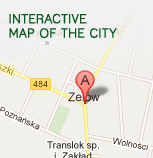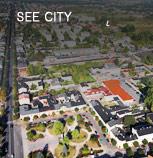The oldest history of Zelów
The settlement of Zelów was founded in the 13th century. Originally it was called Szelyów, and then Zeliów. The first historical mention of it was found in the book by Jan Łaski titled "Liber Beneficiorum", and it dates back to 1402. By the end of the 18th century, Zelów was a typical yeomen's village, whose inhabitants earned their living by farming and breeding cattle.
According to the historical sources, the estate in Zelów owned then by Józef Świdziński, was purchased by Czechs, who arrived in Poland. They introduced textile industry, which has functioned in this region until the present times. The Czechs mainly dealt with manual weaving. The Zelów's workshops became specialised in manufacturing satin, cretonne, and decorative plushes made of cotton warp and wool weft.
- Diversity of settlers is a characteristics of Zelów
For quite a while "Zelów's" Czechs had a dominant position, however after the World War I and establishment of Czechoslovakia, they started leaving Poland and returning to their fatherland. Following the intensive migration of the Czechs, which took place between the two world wars, Poles, Germans and Jews started arriving in Zelów. One of the characteristic features of Zelów, especially at that time, was development of various religions. Each nation cultivated their own religion, and the Evangelical and Reformed Parish had the biggest congregation.
In the period between the two wars the City's economic potential increased significantly. Many textile factories, such as K. Rajchert's manufacture in Herbertów, were established.
After World War II, the number of Czechs decreased significantly. Many Germans also left. Their place and the place of Jews murdered by the occupants were taken by Poles from the neighbouring villages. The Free Evangelical and Reformed Church, Methodists, Czech Brothers and Judaic church ceased existing. Until the present times, four religions are practised in Zelów: Roman - Catholic, Evangelical - Reformed, Christian Baptistm, and Evangelical - Augsburg.
After the war, the City's economic situation also changed. In June 1949, the "Fanar" - Zelów's Cotton Plant - Zelów largest manufacturing enterprise, was set up on the basis of the former private textile manufacturers. However, it could not meet the rules of the market economy, which was developing in the early 90ies, and after it had announced its insolvency it was liquidated. The property of the liquidated plant was acquired by private investors, who developed such activity as production of cotton fabric and medical (dressing) materials.
In 1954, Zelów received the rights of the settlement, and three years later (1957) the city rights. In 1976, the City and Commune merged into a single administrative unit, and since 1990 they have become a single self-governing community.



























